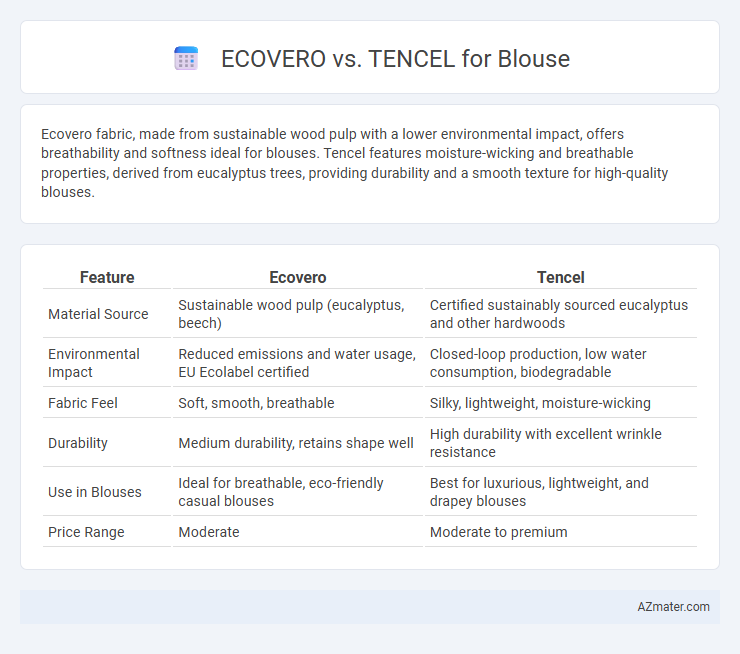Ecovero fabric, made from sustainable wood pulp with a lower environmental impact, offers breathability and softness ideal for blouses. Tencel features moisture-wicking and breathable properties, derived from eucalyptus trees, providing durability and a smooth texture for high-quality blouses.
Table of Comparison
| Feature | Ecovero | Tencel |
|---|---|---|
| Material Source | Sustainable wood pulp (eucalyptus, beech) | Certified sustainably sourced eucalyptus and other hardwoods |
| Environmental Impact | Reduced emissions and water usage, EU Ecolabel certified | Closed-loop production, low water consumption, biodegradable |
| Fabric Feel | Soft, smooth, breathable | Silky, lightweight, moisture-wicking |
| Durability | Medium durability, retains shape well | High durability with excellent wrinkle resistance |
| Use in Blouses | Ideal for breathable, eco-friendly casual blouses | Best for luxurious, lightweight, and drapey blouses |
| Price Range | Moderate | Moderate to premium |
Introduction to Eco-Friendly Fabrics: Ecovero vs Tencel
Ecovero and Tencel are leading sustainable fabrics often used for eco-friendly blouses, both derived from renewable wood sources with lower environmental impacts than conventional fibers. Ecovero, produced by Lenzing, boasts a 50% lower water and energy consumption, certified by EU Ecolabel, ensuring transparency in sustainable production. Tencel, known for its exceptional softness and breathability, is made via a closed-loop process that recycles water and solvents, making it a top choice for sustainable fashion designers prioritizing eco-conscious materials.
What is Ecovero? Key Features and Benefits
Ecovero is a sustainable viscose fiber certified by the European Union Ecolabel, produced from responsibly sourced wood pulp, offering an eco-friendly alternative to conventional viscose. Its key features include lower water usage, reduced emissions, and sustainable sourcing practices, ensuring minimal environmental impact during production. Ecovero's benefits for blouse fabrics include softness, breathability, and durability, combined with a significantly smaller carbon footprint compared to traditional viscose fibers.
What is Tencel? Key Features and Benefits
Tencel is a brand name for a type of lyocell fiber made from sustainably sourced wood pulp, primarily from eucalyptus, beech, and spruce trees. Key features include its breathability, moisture-wicking properties, and silky smooth texture, which make it ideal for blouses that require comfort and a luxurious feel. Benefits of Tencel fabric include biodegradability, hypoallergenic qualities, and superior durability compared to conventional fibers, supporting eco-friendly and long-lasting fashion choices.
Environmental Impact: Ecovero vs Tencel
Ecovero fibers are produced from certified sustainable wood sources and utilize up to 50% less water and greenhouse gas emissions compared to generic viscose, reducing their overall environmental footprint. Tencel, derived from sustainably managed eucalyptus forests, employs a closed-loop production process that recycles 99% of its solvents and water, minimizing pollution and waste. Both fabrics offer eco-friendly alternatives for blouse manufacturing, but Tencel's advanced closed-loop technology and higher resource efficiency generally result in a lower environmental impact than Ecovero.
Comfort and Wearability for Blouses
Ecovero and Tencel fibers both offer exceptional comfort and wearability for blouses, with Ecovero known for its smooth texture and breathability derived from sustainable wood-based sources. Tencel excels in moisture-wicking properties and softness, promoting a cool and gentle feel on the skin, which enhances all-day wear comfort. Both fabrics feature durability and eco-friendly credentials, making them ideal choices for comfortable, sustainable blouse materials.
Durability and Maintenance Comparison
Ecovero fibers provide high durability and resistance to wear, making blouses made from this fabric suitable for frequent use and multiple washes without significant degradation. Tencel, derived from sustainably sourced wood pulp, offers excellent moisture management and softness but may require more delicate care to maintain its longevity and avoid fiber weakening. Blouses crafted from Ecovero generally demand less rigorous maintenance than Tencel while still delivering comparable comfort and eco-friendly qualities.
Aesthetic Appeal: Texture, Drape, and Color
Ecovero fabric offers a smooth texture with a moderate sheen, providing a crisp drape that maintains blouse shape while enhancing color vibrancy, ideal for structured designs. Tencel is renowned for its exceptionally soft, silky texture and fluid drape, creating elegant movement and deep, rich color saturation that complements flowing blouse styles. Both fibers support vibrant dyeing, but Tencel's superior moisture absorption results in richer hues and a more lustrous finish, elevating aesthetic appeal in luxurious blouse creations.
Cost-Effectiveness for Blouse Production
Ecovero fibers offer a more cost-effective raw material option for blouse production due to their lower price point compared to Tencel, while maintaining comparable sustainability credentials. Tencel, produced from sustainably harvested wood pulp through a closed-loop process, demands higher production costs, impacting overall blouse pricing. Manufacturers seeking a balance between eco-friendliness and budget constraints often prefer Ecovero for scalable and affordable blouse manufacturing.
Consumer Preference and Brand Trends
Ecovero and Tencel fibers are both favored in sustainable fashion, with Ecovero gaining consumer preference for its eco-certified viscose production and reduced environmental impact, appealing to ethically conscious buyers of blouses. Tencel, derived from sustainably sourced eucalyptus wood, is praised for its softness and breathability, often trending among premium brands focusing on comfort and luxury. Brand trends indicate a rising demand for Ecovero in mid-range collections, while Tencel remains a popular choice in high-end apparel lines, highlighting consumer segmentation based on price and sustainability values.
Final Verdict: Which is Better for Blouses?
Ecovero and Tencel are both sustainable fabric options with Ecovero offering eco-certified viscose derived from sustainably managed forests, while Tencel features fibers made from wood pulp that provide exceptional breathability and moisture management. For blouses, Tencel excels in softness, drape, and skin sensitivity, making it ideal for lightweight, comfortable wear. The final verdict favors Tencel for blouses due to its superior sustainability credentials, enhanced durability, and outstanding comfort properties.

Infographic: Ecovero vs Tencel for Blouse
 azmater.com
azmater.com